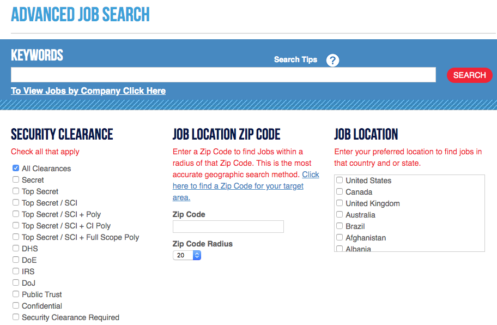INSIDE THE 
NEWS + ADVICE
Do You Know How to Search Effectively

It’s been said that all solutions breed new problems. In this case the culprit is technology. The internet has made it easier to post, look for, and also respond to job postings. But this has created a flood of activity and content to sort through for both job seekers and employers alike.
By now you’ve heard of the dreaded employer ATS (Applicant Tracking System) and its purpose. Now, let me introduce you to its counterpart. It’s what I like to call the OTS (Opportunity Tracking System) here on the ClearedJobs.Net website. This OTS puts the same technology to work for you.
Follow along and you’ll not only learn how to filter through the tens of thousands of active jobs on our site, but you’ll also gain a little appreciation for the way recruiters search our resume database to find qualified cleared talent.
- Understand basic Boolean search terms. When you search for jobs using a basic term like project manager for example, the system will pull up every job with the word project or manager anywhere in the description. Typing “project manager” in quotation marks however will only pull up job descriptions that have those words, in that order. Open a job description and you’ll see that the key phrase “project manager” is highlighted in yellow everywhere it appears in the job posting. This is the same way key words appear on your resume when a recruiter searches the resume database.
- Use your industry knowledge to craft search strings. Often organizations will substitute the term “program manager” for “project manager”. In this case you can use the search string: “Project Manager” OR “Program Manager” to cast an even wider net. The string “Project Manager” OR “Program Manager” OR “Program Analyst” OR “Project Analyst” is even better. The more you know about your career field the better you’ll be at crafting search strings.

- Start wide then get narrow. Now you can winnow this number down based on your security clearance. Remember to select clearance levels that you’re eligible to work in – not just your current clearance level. So if you have a Top Secret, but would also work in a job that only requires a Secret clearance, select both choices. If you have a strong desire to work somewhere down south, you might filter locations like Mississippi, Alabama, Georgia and Florida. Now you’ve made it down to a very manageable number of jobs. You can further narrow your choices by Job Title or by Company.
- Don’t get too narrow. Be careful though, not to over filter. While it may be tempting to click a box in every category, it rarely leads to success. Remember that job descriptions are written by people and therefore they may not always offer the clearest picture of the actual job. Start with the broad key word search strings. Use lots of “OR” connections and not so many “AND” connections at first. If your search returns jobs in the thousands – then begin adding other filters.
It’s also important to note that the search function does exactly what you tell it to do, no more, no less. The way you describe your skills and the way an employer describes their needs have to match up perfectly for the system to return a hit. A single typo can be the difference between seeing hundreds of jobs and seeing zero jobs.
Search strings are an art, the more you work with them the better you’ll get. Just as the strong recruiters will approach a single search from multiple angles, so should a cleared job seeker.
Job Agents make the technology work for you.
We get it, this journey was great, but it’s not a trip you want to take every day. That’s why smart job seekers save their search results and/or create job agents. Saving the search string allows you to log back on at a later date and quickly run the same search parameters again to see what’s been added (or subtracted from the site). Job agents take it one step further. Once established, these send you an email whenever a job that meets your criteria gets posted to the site. It’s a great way to make sure you don’t lose out on an opportunity just because you haven’t had the time to search in a few days.
Remember, cleared employers aren’t spending the money to post their cleared job openings on targeted sites like ClearedJobs.Net just for public relations. They have a legitimate need to fill. Using this technology to search for current openings and to get alerted as soon as future positions are posted is key to a successful job hunt.
This entry was posted on Friday, November 01, 2019 4:15 pm
